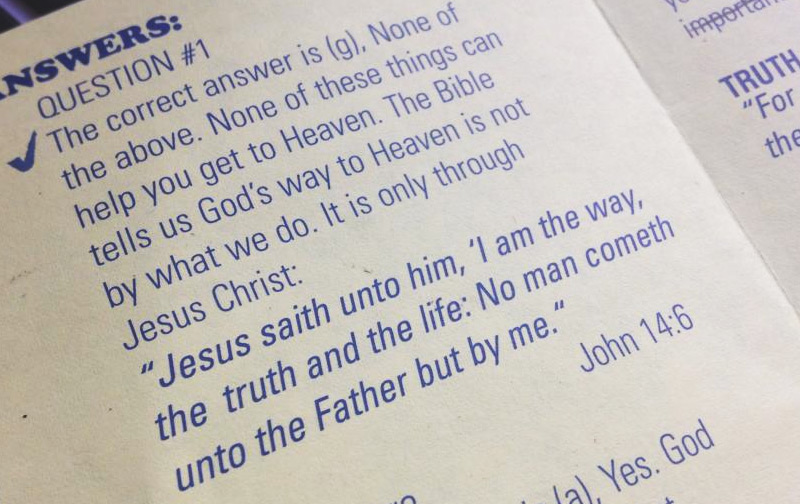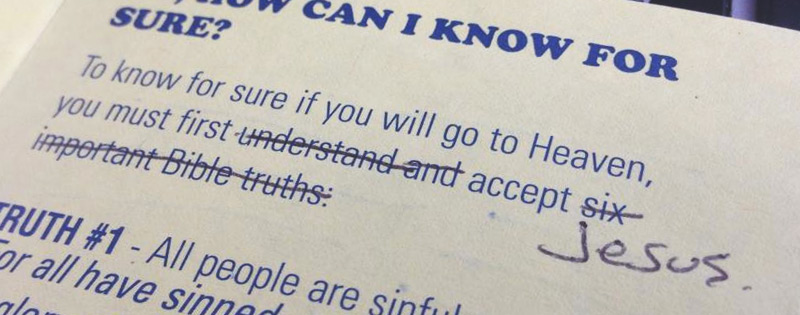A few days ago somebody gave me a scrap of yellow paper with blue letters on it. Across the top it read: “Am I Going to Heaven? QUIZ!”
Not too long ago, I was the one carrying those papers, handing them to strangers in hopes of altering their eternal destination. So I recognized all the Bible verses, the step-by-step, point-by-point sales pitch. But now, I have no interest in buying what they’re selling.
If this is the way to heaven, I’m not going. Here’s why:
1. Jesus isn’t the way to heaven.

Too often, Christians reduce Jesus to a solution, just a bridge to walk across to get to heaven instead of hell. In the entirety of this pamphlet, there doesn’t seem to be much purpose for Jesus at all other than getting us to Heaven. He was our substitute, it says. He made a way. He offers a free gift.
If there’s any relational aspect to this religion, I wouldn’t know about it. If Jesus taught anything about how to live with one another and with God, it doesn’t tell me. Only that Jesus is God’s way to Heaven.
Even the verse cited in support of this point betrays the ideas presented here. “God’s way to Heaven is through Jesus,” the pamphlet says. Then immediately it quotes John 14:6: “No man comes to the Father but by me.”
Did you catch that? This pamphlet just used “Heaven” and “the Father” interchangeably. As if our relationship to the Divine can be reduced to a destination. As if getting inside the pearly gates matters more than knowing the Creator. As if they are the same thing.
The Scripture tells a different story:
“Christ suffered for our sins once for all time. He never sinned, but he died for sinners to bring you safely home to God.” (I Peter 3:18)
“God was reconciling the world to himself in Christ, not counting people’s sins against them. And he has committed to us the message of reconciliation.” (II Cor. 5:19)
If you’re going to put Bible verses in your little yellow pamphlets, at least take the time to read what they actually say.
Jesus is not the way to Heaven; Jesus is the way to the Father. The Gospel is not about destination; the Gospel is about reconciliation.
2. Understanding Bible truths won’t save me.

The problem with this sort of evangelism is it reduces a spiritual reality to intellectual ideas, to be accepted or rejected.
It is internally inconsistent, asserting first that Jesus is the way to Heaven then saying that “understanding and accepting truth” is the way to know you’re going to Heaven.
Read it again, because you might miss it the first time: They substituted “accepting Bible truths” for “knowing Jesus”. (That’s why I pulled out a pen and fixed it for them as soon as I read it.)
Honestly, if my eternal destination is dependent on understanding and accepting truths, I’m screwed. I’ve known these “six important Bible truths” for decades, and I’m still not sure I really understand them. There are many people who may not have ever heard these truths at all, at least not laid out like this – cherry-picked from all over the New Testament and arranged in a neat step-by-step fashion.
But knowledge is not the essence of Christianity. Faith is. And Faith doesn’t rest in mental assent to propositions; it rests in Jesus alone.
3. I don’t know for sure that I can know for sure.

Reading through these few pages, I get the sense that most important aspect of Christianity is “knowing for sure that I will go to heaven”.
That phrase is used five times, with no small amount of certainty. Understand these truths, assent to these ideas, and you can know for sure that if you died today you will go to heaven.
But it only works as long as I don’t question the authority of this scrap of paper. If I were convinced that a miniature pamphlet from a stranger held absolute truth, perhaps I would feel more secure in its promises. Even if I were to assume that the presence of Scripture verses lends infallibility to the pamphlet, I have no way of knowing that the verses actually mean what they are purported to mean. (I’m pretty sure that they don’t. See #1.)
This bit of Christian salesmanship is making promises that it cannot keep. I have believed all the right verses, agreed to all the right truths, prayed all the right prayers for decades, and still I have doubts. Some days I don’t know if God is real, much less Heaven or Hell or the Bible. My faith persists despite these doubts.
In My Bright Abyss, Christian Wiman writes: “The compulsion to find… certainty becomes its own punishment. This realization is not the end of theology, but the beginning of it.”
His sentiments echo those of the author of Romans, who said: “Now hope that is seen is not hope. For who hopes for what he sees?” (Rom. 8:25)
Ultimately, this promise of certainty, of faith without doubt, is dangerous to genuine belief.
This sort of gospel only works as long as you can convince people that their souls are in mortal danger. It does nothing to address the brokenness of humanity, our longing for meaning. And when faced with the crushing questions that will inevitably come, this gospel will have nothing to offer but more empty certainty.
4. Jesus shouldn’t be a sales gimmick

Perhaps the worst thing about this religious salesmanship is the blatant bait-and-switch at the end. It’s a trick as obvious as any online pop-up ad or sleazy sales trick.
As soon as you sign up for the “free gift”, you literally turn the page and see the fine print. Except here they aren’t roping you into a two-year magazine subscription by offering a free issue or two up front. They offer the “free gift of salvation”, and then reveal all the strings attached: Read your Bible every day. Live a life pleasing to God. Attend church. Evangelize other people.
No explantation is given, no narrative context offered. The reader is left to conclude that these demands are simply the conditions of the “free gift”. It’s a religion that begins with the promise of afterlife certainty, and ends with a list of required actions and behaviors. The gospel is reduced to a legal transaction, grace is just mechanical, any actual connection with the Divine is solely pragmatic.
///
If this is the gospel, I don’t want it. If this is how to get to heaven, I’m not going.
Some people tell me I shouldn’t be so cynical, shouldn’t be so critical. As long as a seed is planted, it doesn’t matter, right? But I’m concerned about what will grow from a seed like this. When you sow a gospel so watered down and reductionistic, it doesn’t tend to grow up into healthy spirituality.
I’ve watched over and over as people who signed up for Christianity because of the promise of Heaven grew disillusioned by the unfulfilled guarentees of certainty, weary under the weight of the religious bait-and-switch, and left the faith altogether. Tell me, then, was this little seed better than none at all?
There’s a better Gospel. I’m sure of it. It speaks of reconciliation to God, Heaven coming to earth, life without end beginning now.
Perhaps it can’t be so neatly contained on a scrap of paper. But still, it’s a story worth telling.
published June 18, 2014
subscribe to updates:
(it's pretty much the only way to stay in touch with me these days)

